| Listing 1 - 7 of 7 |
Sort by
|
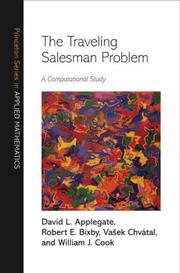
ISBN: 9780691129938 0691129932 Year: 2006 Publisher: Princeton: Princeton university press,
Abstract | Keywords | Export | Availability | Bookmark
 Loading...
Loading...Choose an application
- Reference Manager
- EndNote
- RefWorks (Direct export to RefWorks)
The authors have done a wonderful job of explaining how they developed new techniques in response to the challenges posed by ever larger instances of the Traveling Salesman Problem. MAA Online By bringing together the best work from a wide array of researchers, advancing the field where needed, describing their findings in a book, and implementing everything in an extremely well-written computer program, the authors show how research in computational combinatorial optimization should be done
Traveling-salesman problem --- Problèmes de tournées --- Traveling-salesman problem. --- Problèmes de tournées. --- Operational research. Game theory --- 519.8 --- TSP (Traveling salesman problem) --- Combinatorial optimization --- Graph theory --- Vehicle routing problem --- 519.8 Operational research --- Operational research --- optimisation --- PROGRAMMATION MATHEMATIQUE --- OPTIMISATION COMBINATOIRE
Periodical
Abstract | Keywords | Export | Availability | Bookmark
 Loading...
Loading...Choose an application
- Reference Manager
- EndNote
- RefWorks (Direct export to RefWorks)
Mathematical optimization --- Combinatorial optimization --- Optimisation mathématique --- Optimisation combinatoire --- Optimaliseren. --- Optimization, Combinatorial --- Combinatorial optimization. --- Mathematical optimization. --- Combinatorial analysis --- Optimization (Mathematics) --- Optimization techniques --- Optimization theory --- Systems optimization --- Mathematical analysis --- Maxima and minima --- Operations research --- Simulation methods --- System analysis --- Mathematical Sciences --- Applied Mathematics --- Optimizaton. --- Operations Research --- Optimització matemàtica --- Optimització combinatòria --- Optimisation mathématique --- Optimització matemàtica. --- Optimització combinatòria.

ISBN: 9780262220804 0262220806 9780262513470 0262513471 0262257157 1282096834 1429477741 9780262257152 9781429477741 0262299984 Year: 2006 Publisher: Cambridge (Mass.): MIT Press,
Abstract | Keywords | Export | Availability | Bookmark
 Loading...
Loading...Choose an application
- Reference Manager
- EndNote
- RefWorks (Direct export to RefWorks)
"Online decision making under uncertainty and time constraints represents one of the most challenging problems for robust intelligent agents. In an increasingly dynamic, interconnected, and real-time world, intelligent systems must adapt dynamically to uncertainties, update existing plans to accommodate new requests and events, and produce high-quality decisions under severe time constraints. Such online decision-making applications are becoming increasingly common: ambulance dispatching and emergency city-evacuation routing, for example, are inherently online decision-making problems; other applications include packet scheduling for Internet communications and reservation systems. This book presents a novel framework, online stochastic optimization, to address this challenge. This framework assumes that the distribution of future requests, or an approximation thereof, is available for sampling, as is the case in many applications that make either historical data or predictive models available. It assumes additionally that the distribution of future requests is independent of current decisions, which is also the case in a variety of applications and holds significant computational advantages. The book presents several online stochastic algorithms implementing the framework, provides performance guarantees, and demonstrates a variety of applications. It discusses how to relax some of the assumptions in using historical sampling and machine learning and analyzes different underlying algorithmic problems. And finally, the book discusses the framework's possible limitations and suggests directions for future research."--Publisher's website.
Stochastic processes --- Combinatorial optimization --- Online algorithms --- Operations research --- Processus stochastiques --- Optimisation combinatoire --- Recherche opérationnelle --- Stochastic processes. --- Combinatorial optimization. --- Online algorithms. --- Operations research. --- 681.3*G13 --- Operational analysis --- Operational research --- Industrial engineering --- Management science --- Research --- System theory --- Computer algorithms --- Online data processing --- Optimization, Combinatorial --- Combinatorial analysis --- Mathematical optimization --- Random processes --- Probabilities --- Numerical linear algebra: conditioning; determinants; eigenvalues and eigenvectors; error analysis; linear systems; matrix inversion; pseudoinverses; singular value decomposition; sparse, structured, and very large systems (direct and iterative methods) --- COMPUTER SCIENCE/General
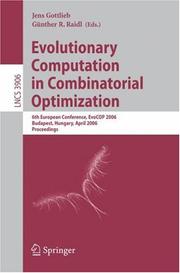
ISBN: 9783540331780 3540331786 3540331794 Year: 2006 Publisher: Berlin ; New York : Springer,
Abstract | Keywords | Export | Availability | Bookmark
 Loading...
Loading...Choose an application
- Reference Manager
- EndNote
- RefWorks (Direct export to RefWorks)
This book constitutes the refereed proceedings of the 6th European Conference on Evolutionary Computation in Combinatorial Optimization, EvoCOP 2006, held in Budapest, Hungary in April 2006. The 24 revised full papers presented were carefully reviewed and selected from 77 submissions. The papers cover evolutionary algorithms as well as various other metaheuristics, like scatter search, tabu search, memetic algorithms, variable neighborhood search, greedy randomized adaptive search procedures, ant colony optimization, and particle swarm optimization algorithms. The papers deal with representations, heuristics, analysis of problem structures, and comparisons of algorithms. The list of studied combinatorial optimization problems includes prominent examples like graph coloring, knapsack problems, the traveling salesperson problem, scheduling, graph matching, as well as specific real-world problems.
Evolutionary computation --- Evolutionary programming (Computer science) --- Combinatorial optimization --- Réseaux neuronaux à structure évolutive --- Programmation évolutive --- Optimisation combinatoire --- Congresses. --- Congrès --- Computer Science --- Engineering & Applied Sciences --- Computer science. --- Computers. --- Algorithms. --- Numerical analysis. --- Computer science --- Computer Science. --- Computation by Abstract Devices. --- Algorithm Analysis and Problem Complexity. --- Numeric Computing. --- Discrete Mathematics in Computer Science. --- Mathematics. --- Computer mathematics --- Discrete mathematics --- Electronic data processing --- Mathematical analysis --- Algorism --- Algebra --- Arithmetic --- Automatic computers --- Automatic data processors --- Computer hardware --- Computing machines (Computers) --- Electronic brains --- Electronic calculating-machines --- Electronic computers --- Hardware, Computer --- Computer systems --- Cybernetics --- Machine theory --- Calculators --- Cyberspace --- Informatics --- Science --- Mathematics --- Foundations --- Computer software. --- Electronic data processing. --- Computational complexity. --- Complexity, Computational --- ADP (Data processing) --- Automatic data processing --- Data processing --- EDP (Data processing) --- IDP (Data processing) --- Integrated data processing --- Computers --- Office practice --- Software, Computer --- Automation --- Computer science—Mathematics. --- Discrete mathematics. --- Theory of Computation. --- Numerical Analysis. --- Discrete mathematical structures --- Mathematical structures, Discrete --- Structures, Discrete mathematical --- Numerical analysis
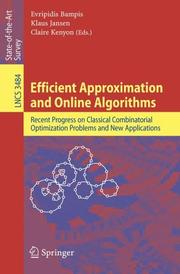
ISBN: 9783540322122 3540322124 3540322132 Year: 2006 Publisher: New York : Springer,
Abstract | Keywords | Export | Availability | Bookmark
 Loading...
Loading...Choose an application
- Reference Manager
- EndNote
- RefWorks (Direct export to RefWorks)
Combinatorial optimization. --- Mathematical optimization. --- Optimisation combinatoire --- Optimisation mathématique --- Computer algorithms --- Online algorithms --- Combinatorial optimization --- Computer Science --- Engineering & Applied Sciences --- Data processing --- Computer algorithms. --- Online algorithms. --- Data processing. --- Optimization, Combinatorial --- Computer science. --- Computer communication systems. --- Algorithms. --- Numerical analysis. --- Computer science --- Computer graphics. --- Computer Science. --- Algorithm Analysis and Problem Complexity. --- Discrete Mathematics in Computer Science. --- Numeric Computing. --- Computer Communication Networks. --- Computer Graphics. --- Mathematics. --- Automatic drafting --- Graphic data processing --- Graphics, Computer --- Computer art --- Graphic arts --- Electronic data processing --- Engineering graphics --- Image processing --- Computer mathematics --- Discrete mathematics --- Mathematical analysis --- Algorism --- Algebra --- Arithmetic --- Communication systems, Computer --- Computer communication systems --- Data networks, Computer --- ECNs (Electronic communication networks) --- Electronic communication networks --- Networks, Computer --- Teleprocessing networks --- Data transmission systems --- Digital communications --- Electronic systems --- Information networks --- Telecommunication --- Cyberinfrastructure --- Network computers --- Informatics --- Science --- Digital techniques --- Mathematics --- Foundations --- Distributed processing --- Combinatorial analysis --- Mathematical optimization --- Online data processing --- Algorithms --- Computer software. --- Computational complexity. --- Electronic data processing. --- ADP (Data processing) --- Automatic data processing --- EDP (Data processing) --- IDP (Data processing) --- Integrated data processing --- Computers --- Office practice --- Complexity, Computational --- Machine theory --- Software, Computer --- Computer systems --- Automation --- Computer science—Mathematics. --- Discrete mathematics. --- Computer networks. --- Numerical Analysis. --- Discrete mathematical structures --- Mathematical structures, Discrete --- Structures, Discrete mathematical --- Numerical analysis
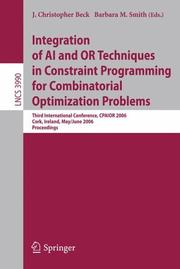
ISBN: 9783540343066 3540343067 3540343075 Year: 2006 Publisher: Berlin : Springer,
Abstract | Keywords | Export | Availability | Bookmark
 Loading...
Loading...Choose an application
- Reference Manager
- EndNote
- RefWorks (Direct export to RefWorks)
Constraints (Artificial intelligence) --- Constraint programming (Computer science) --- Combinatorial optimization --- Artificial intelligence --- Operations research --- Contraintes (Intelligence artificielle) --- Programmation par contraintes --- Optimisation combinatoire --- Intelligence artificielle --- Recherche opérationnelle --- Congresses. --- Congrès --- Applied Mathematics --- Computer Science --- Engineering & Applied Sciences --- Constraint satisfaction (Artificial intelligence) --- Computer science. --- Software engineering. --- Algorithms. --- Numerical analysis. --- Computer science --- Artificial intelligence. --- Computer Science. --- Software Engineering/Programming and Operating Systems. --- Numeric Computing. --- Discrete Mathematics in Computer Science. --- Algorithm Analysis and Problem Complexity. --- Artificial Intelligence (incl. Robotics). --- Operations Research/Decision Theory. --- Mathematics. --- AI (Artificial intelligence) --- Artificial thinking --- Electronic brains --- Intellectronics --- Intelligence, Artificial --- Intelligent machines --- Machine intelligence --- Thinking, Artificial --- Bionics --- Cognitive science --- Digital computer simulation --- Electronic data processing --- Logic machines --- Machine theory --- Self-organizing systems --- Simulation methods --- Fifth generation computers --- Neural computers --- Computer mathematics --- Discrete mathematics --- Mathematical analysis --- Algorism --- Algebra --- Arithmetic --- Computer software engineering --- Engineering --- Informatics --- Science --- Mathematics --- Foundations --- Electronic data processing. --- Computational complexity. --- Computer software. --- Operations research. --- Artificial Intelligence. --- Operational analysis --- Operational research --- Industrial engineering --- Management science --- Research --- System theory --- Software, Computer --- Computer systems --- Complexity, Computational --- ADP (Data processing) --- Automatic data processing --- Data processing --- EDP (Data processing) --- IDP (Data processing) --- Integrated data processing --- Computers --- Office practice --- Automation --- Computer science—Mathematics. --- Decision making. --- Deciding --- Decision (Psychology) --- Decision analysis --- Decision processes --- Making decisions --- Management --- Management decisions --- Choice (Psychology) --- Problem solving --- Decision making --- Discrete mathematics. --- Software Engineering. --- Numerical Analysis. --- Operations Research and Decision Theory. --- Discrete mathematical structures --- Mathematical structures, Discrete --- Structures, Discrete mathematical --- Numerical analysis
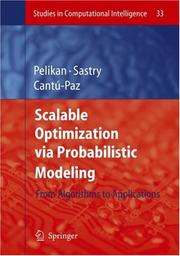
ISSN: 1860949X ISBN: 9783540349532 3540349537 9786610744213 1280744219 3540349545 Year: 2006 Volume: 33 Publisher: Berlin: Springer,
Abstract | Keywords | Export | Availability | Bookmark
 Loading...
Loading...Choose an application
- Reference Manager
- EndNote
- RefWorks (Direct export to RefWorks)
This book focuses like a laser beam on one of the hottest topics in evolutionary computation over the last decade or so: estimation of distribution algorithms (EDAs). EDAs are an important current technique that is leading to breakthroughs in genetic and evolutionary computation and in optimization more generally. I'm putting Scalable Optimization via Probabilistic Modeling in a prominent place in my library, and I urge you to do so as well. This volume summarizes the state of the art at the same time it points to where that art is going. Buy it, read it, and take its lessons to heart. David E Goldberg, University of Illinois at Urbana-Champaign This book is an excellent compilation of carefully selected topics in estimation of distribution algorithms---search algorithms that combine ideas from evolutionary algorithms and machine learning. The book covers a broad spectrum of important subjects ranging from design of robust and scalable optimization algorithms to efficiency enhancements and applications of these algorithms. The book should be of interest to theoreticians and practitioners alike, and is a must-have resource for those interested in stochastic optimization in general, and genetic and evolutionary algorithms in particular. John R. Koza, Stanford University This edited book portrays population-based optimization algorithms and applications, covering the entire gamut of optimization problems having single and multiple objectives, discrete and continuous variables, serial and parallel computations, and simple and complex function models. Anyone interested in population-based optimization methods, either knowingly or unknowingly, use some form of an estimation of distribution algorithm (EDA). This book is an eye-opener and a must-read text, covering easy-to-read yet erudite articles on established and emerging EDA methodologies from real experts in the field. Kalyanmoy Deb, Indian Institute of Technology Kanpur This book is an excellent comprehensive resource on estimation of distribution algorithms. It can serve as the primary EDA resource for practitioner or researcher. The book includes chapters from all major contributors to EDA state-of-the-art and covers the spectrum from EDA design to applications. These algorithms strategically combine the advantages of genetic and evolutionary computation with the advantages of statistical, model building machine learning techniques. EDAs are useful to solve classes of difficult real-world problems in a robust and scalable manner. Una-May O'Reilly, Massachusetts Institute of Technology Machine-learning methods continue to stir the public's imagination due to its futuristic implications. But, probability-based optimization methods can have great impact now on many scientific multiscale and engineering design problems, especially true with use of efficient and competent genetic algorithms (GA) which are the basis of the present volume. Even though efficient and competent GAs outperform standard techniques and prevent negative issues, such as solution stagnation, inherent in the older but more well-known GAs, they remain less known or embraced in the scientific and engineering communities. To that end, the editors have brought together a selection of experts that (1) introduce the current methodology and lexicography of the field with illustrative discussions and highly useful references, (2) exemplify these new techniques that dramatic improve performance in provable hard problems, and (3) provide real-world applications of these techniques, such as antenna design. As one who has strayed into the use of genetic algorithms and genetic programming for multiscale modeling in materials science, I can say it would have been personally more useful if this would have come out five years ago, but, for my students, it will be a boon. Duane D. Johnson, University of Illinois at Urbana-Champaign.
Distribution (Probablility theory) --- Genetic algorithms. --- Evolutionary computation. --- Machine learning. --- Combinatorial optimization. --- Distribution (Théorie des probabilités) --- Algorithmes génétiques --- Réseaux neuronaux à structure évolutive --- Apprentissage automatique --- Optimisation combinatoire --- Computer programs. --- Logiciels --- Combinatorial optimization --- Evolutionary computation --- Distribution (Probability theory) --- Genetic Algorithms --- Machine Learning --- Data processing --- Algorithms. --- Electronic books. -- local. --- Evolution equations -- Numerical solutions. --- Genetic algorithms --- Machine learning --- Civil Engineering --- Applied Mathematics --- Mathematical Statistics --- Operations Research --- Engineering & Applied Sciences --- Civil & Environmental Engineering --- Mathematics --- Physical Sciences & Mathematics --- Evolution equations --- Numerical solutions. --- Algorism --- Mathematics. --- Artificial intelligence. --- Probabilities. --- Applied mathematics. --- Engineering mathematics. --- Probability Theory and Stochastic Processes. --- Appl.Mathematics/Computational Methods of Engineering. --- Artificial Intelligence (incl. Robotics). --- Numerical analysis --- Algebra --- Arithmetic --- Foundations --- Distribution (Probability theory. --- Mathematical and Computational Engineering. --- Artificial Intelligence. --- AI (Artificial intelligence) --- Artificial thinking --- Electronic brains --- Intellectronics --- Intelligence, Artificial --- Intelligent machines --- Machine intelligence --- Thinking, Artificial --- Bionics --- Cognitive science --- Digital computer simulation --- Electronic data processing --- Logic machines --- Machine theory --- Self-organizing systems --- Simulation methods --- Fifth generation computers --- Neural computers --- Engineering --- Engineering analysis --- Mathematical analysis --- Distribution functions --- Frequency distribution --- Characteristic functions --- Probabilities --- Probability --- Statistical inference --- Combinations --- Chance --- Least squares --- Mathematical statistics --- Risk --- Data processing. --- Optimization, Combinatorial --- Combinatorial analysis --- Mathematical optimization --- Computation, Evolutionary --- Neural networks (Computer science) --- GAs (Algorithms) --- Genetic searches (Algorithms) --- Algorithms --- Genetic programming (Computer science) --- Learning classifier systems --- Learning, Machine --- Artificial intelligence --- Distribution (Probability theory) - Data processing
| Listing 1 - 7 of 7 |
Sort by
|

 Search
Search Feedback
Feedback About UniCat
About UniCat  Help
Help News
News